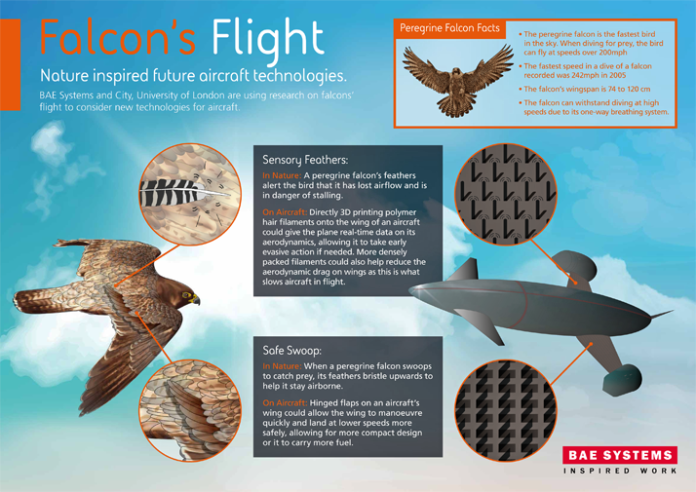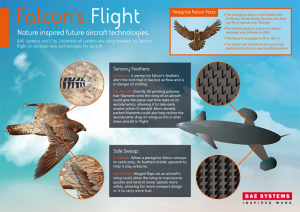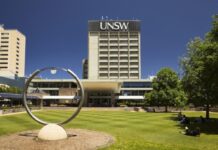
Researchers at BAE Systems and City, University of London are studying the falcons’ flying techniques in an effort to develop new technologies for aircraft that could contribute to their safety in the air, aerodynamics and fuel efficiency.

The research investigated how the peregrine falcon – the world’s fastest bird – is able to stay in control and airborne at speeds of up to 200mph, even in high winds.
The work carried out to date has resulted in the development of several concepts including the so called ‘sensory feathers’ – 3D-printed polymer ‘hair’ filaments which would act like sensors on the body of an aircraft to provide an early warning system if it began to stall.
Researchers also believe that passive polymer filaments, when packed more densely, could direct the airflow very close to the surface of the aircraft, potentially reducing the ‘drag’ on the aircraft wing-skin.
The falcon’s ability to stabilise itself by ruffling its feathers has also inspired the development of small flexible or hinged flaps on an aircraft that could allow the wing to manoeuvre quickly and land more safely at lower speeds.
BAE said the added safety margin gained using this approach could result in the development of more compact designs that would allow future aircraft to carry higher fuel loads.
Professor Christoph Bruecker from City’s Aeronautical Engineering department said the research could deliver significant innovations for the aerospace industry.
“The peregrine falcon is the world’s fastest bird, able to dive for prey at incredibly steep angles and high velocities,” he said.
“The research work has been truly fascinating and I am sure it will deliver some real innovation and benefits for the aerospace sector.”
Professor Clyde Warsop, a specialist in Aerodynamic Flow Control from BAE’s military aircraft business based in Bristol and in Lancashire shares the same sentiment:
“Working with Professor Christoph Bruecker and his team at City, we’ve investigated how we could apply the unique abilities of the peregrine falcon to aircraft,” he said.
“Bio-inspiration is not a new concept; many technologies that we use every day are increasingly inspired by animals and nature.”




















